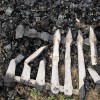Resumen
Biochar, also known as black carbon, is a product derived from organic materials rich in carbon and is found in soils in very stable solid forms, often as deposits. In recent years, considerable research has focused on biochar, its nature, and its properties to explore its potential benefits and negative impacts, particularly for applying to agricultural fields as amendments. This publication provides a general description of biochar, as well as technical details, benefits, and disadvantages of biochar for agricultural and environmental uses. This 4-page fact sheet was written by Rao Mylavarapu, Vimala Nair, and Kelly Morgan, and published by the UF Department of Soil and Water Science, August 2013.
Citas
Cao, X., L. Ma, B. Gao, and W. Harris. 2009. "Dairy-Manure Derived Biochar Effectively Sorbs Lead and Atrazine." Environmental Science and Technology 43(9): 3285-3291. https://doi.org/10.1021/es803092k
Chen, B., D. Zhou, and L. Zhu. 2008. "Transitional Adsorption and Partition of Nonpolar and Polar Aromatic Contaminants by Biochars of Pine Needles with Different Pyrolytic Temperatures." Environmental Science and Technology 42(14): 5137-5143. https://doi.org/10.1021/es8002684
Chen, B., Z. Chen, and S. Lv. 2011. "A Novel Magnetic Biochar Efficiently Sorbs Organic Pollutants and Phosphate." Bioresource Technology 102(2): 716-723. https://doi.org/10.1016/j.biortech.2010.08.067
Chun, Y., G. Sheng, C. T. Chiou, and B. Xing. 2004. "Compositions and Sorptive Properties of Crop Residue-Derived Chars." Environmental Science and Technology 38(17): 4649-4655. https://doi.org/10.1021/es035034w
Glaser, B., L. Haumaier, G. Guggenberger, and W. Zech. 2001. "The 'Terra Preta' Phenomenon: A Model for Sustainable Agriculture in the Humid Tropics." Naturwissenschaften 88(1): 37-41. https://doi.org/10.1007/s001140000193
Ippolito, J. A., D. A. Laird, and W. A. Busscher. 2012. "Environmental Benefits of Biochar". Journal of Environmental Quality 41(4): 967-972 https://doi.org/10.2134/jeq2012.0151
Lentz, R. D., and J. A. Ippolito. 2012. "Biochar and Manure Affect Calcareous Soil and Corn Silage Nutrient Concentrations and Uptake." Journal of Environmental Quality 41(4): 1033-1043. https://doi.org/10.2134/jeq2011.0126
Novak, J. M., I. Lima, B. Xing, J. W. Gaskin, C. Steiner, K. C. Das, M. Ahmedna, D. Rehrah, D.W. Watts, W. J. Busscher, et al. 2009. "Characterization of Designer Biochar Produced at Different Temperatures and Their Effects on a Loamy Sand." Annals of Environmental Science 3(1): 2.
Qiu, Y., Z. Zheng, Z. Zhou, and G. D. Sheng. 2009. "Effectiveness and Mechanisms of Dye Adsorption on a StrawBased Biochar." Bioresource Technology 100(21): 5348-5351. https://doi.org/10.1016/j.biortech.2009.05.054
Schnell, R. W., D. M. Vietor, T. L. Provin, C. L. Munster, and S. Capareda. 2012. "Capacity of Biochar Application to Maintain Energy Crop Productivity: Soil Chemistry, Sorghum Growth, and Runoff Water Quality Effects." Journal of Environmental Quality 41(4): 1044-1051. https://doi.org/10.2134/jeq2011.0077
Spokas, K. A., K. B. Cantrell, J. M. Novak, D. A. Archer, J. A. Ippolito, H. P. Collins, A. A. Boateng, I. M. Lima, M. C. Lamb, A. J. McAloon, R. D. Lentz, and K. A. Nichols. 2012. "Biochar: A Synthesis of Its Agronomic Impact Beyond Carbon Sequestration." Journal of Environmental Quality 41(4): 973-989. https://doi.org/10.2134/jeq2011.0069
Uchimiya, M., I. M. Lima, K. Thomas Klasson, S. C. Chang, L. H. Wartelle, and J. E. Rodgers. 2010. "Immobilization of Heavy Metal Ions (CuII, CdII, NiII, and PbII) by Broiler Litter-Derived Biochars in Water and Soil." Journal of Agricultural and Food Chemistry 58(9): 5538-5544. https://doi.org/10.1021/jf9044217
Uchimiya, M., K. T. Klasson, L. H. Wartelle, and I. M. Lima. 2011. "Influence of Soil Properties on Heavy Metal Sequestration by Biochar Amendment: 1. Copper Sorption Isotherms and the Release of Cations." Chemosphere 82(10): 1431-1437. https://doi.org/10.1016/j.chemosphere.2010.11.050
Yao, Y., B. Gao, M. Inyang, A. R. Zimmerman, X. Cao, P. Pullammanappallil, and L. Yang. 2011. "Biochar Derived from Anaerobically Digested Sugar Beet Tailings: Characterization and Phosphate Removal Potential." Bioresource Technology 102(10): 6273-6278. https://doi.org/10.1016/j.biortech.2011.03.006
Zheng, W., M. Guo, T. Chow, D. N. Bennett, and N. Rajagopalan. 2010. "Sorption Properties of Greenwaste Biochar for Two Triazine Pesticides." Journal of Hazardous Materials 181(1-3): 121-126.
Unless otherwise specified, articles published in the EDIS journal after January 1, 2024 are licensed under a Creative Commons Attribution-NonCommercial-NoDerivs 4.0 International (CC BY-NC-ND 4.0) license.

